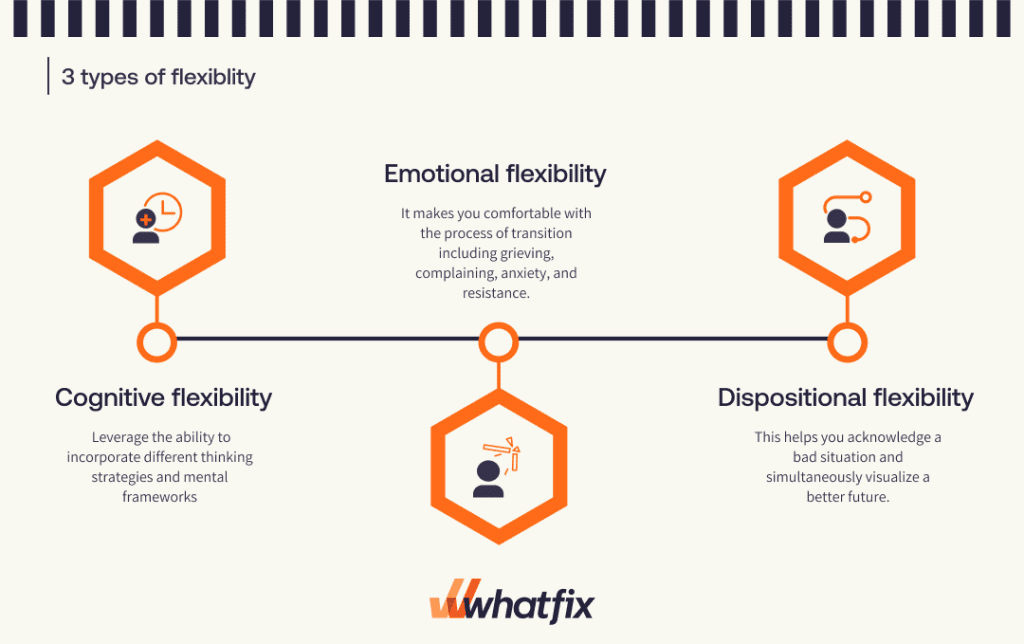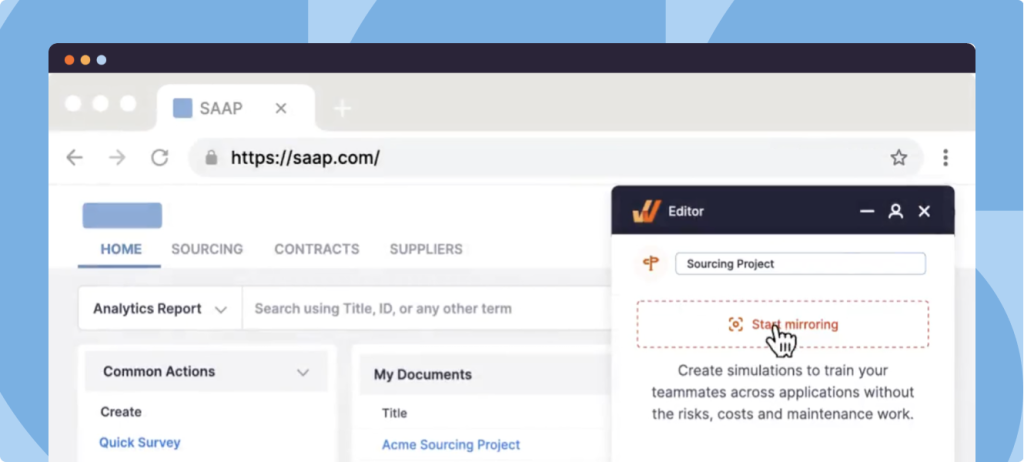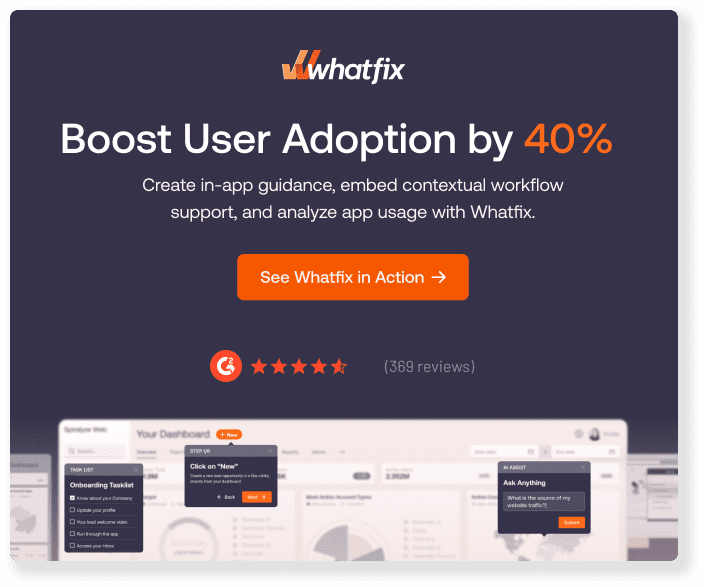Navigating change is inevitable throughout our careers. Whether introducing new technologies, reorganizing personnel, starting a new job, or shifting to remote work, adapting to constant change can often feel like an uphill battle.
Individual employees grappling with the evolving landscape of their workplace often express resistance to change because of the discomfort it brings and the challenges involved when navigating change management initiatives.
Adaptability is the ability of your business and its employees to change their work approach and processes according to new conditions and challenges. Accordingly, increasing the adaptability of your workplace involves developing the skills and willingness to learn new ways of doing things and shift focus towards new goals.
Having an agile, adaptable mindset involves dedication and patience from employees, but is ever important in a time of constant change and frequent new technology disruptions.
In this article, we’ll explore how to encourage adaptability in the workplace, including the importance of adapting to change, adaptability skills to hone, practical strategies tailored to individual employees struggling to cope with the pace of change in their professional environment, and how successful leaders and organizations adapt and embrace change.
What Is Adaptability to Change?
Adaptability to change refers to an individual’s ability to adjust to new conditions, situations, or challenges flexibly and proactively. It involves being open to learning, staying resilient, and finding effective ways to handle transitions in the workplace, such as implementing new technologies, changing processes, organizational restructuring, or new leadership. Adaptable employees can thrive in dynamic environments, respond positively to uncertainty, and help drive continuous improvement by embracing change rather than resisting it.
The Importance of Adapting to Workplace Change
According to Accenture’s Pulse of Change: 2024 index, business leaders faced an all-time high rate of change in 2023 and expect it to accelerate even more in the coming years.
Organizational change is an inevitable phenomenon driven by various factors, including technological advancements, shifts in market demands, organizational restructuring, or responses to global events. Understanding the reasons behind these changes is essential for employees to grasp the importance of adaptation and navigate transitions effectively.
Here are a few reasons why leaders might implement changes in the workplace.
- Market demands: Businesses operate within dynamic markets that are constantly evolving. Changes in consumer preferences, emerging trends, or competitive pressures often require adjustments in products, services, or operational strategies to maintain relevance and competitiveness.
- Technological advancements: Evolving technological advancements continually reshape industries and job roles. Adopting new technologies allows organizations to streamline business processes, enhance efficiency, and stay ahead of the curve. Failure to embrace technological change can lead to obsolescence and a loss of competitive edge.
- Organizational growth or restructuring: As organizations grow or adapt to changing circumstances, they may undergo restructuring initiatives to optimize operations, improve collaboration, or realign resources. Restructuring involves changes in reporting structures, job roles, or departmental functions.
- Regulatory compliance: Changes in legislation, industry regulations, or compliance standards can necessitate adjustments in organizational policies, procedures, or practices. Ensuring compliance is vital for avoiding legal repercussions and maintaining ethical business practices.
Benefits of Workplace Adaptability
Developing adaptability skills gives your workplace and employees several valuable benefits that can be applied in various scenarios. The most obvious advantage of becoming more adaptable is that your team members are more prepared to embrace new challenges.
When your current way of doing things does not limit your thinking and approach to problem-solving, new challenges and goals become more manageable and enjoyable rather than seeming like insurmountable challenges you dread. It also enables your business to stay relevant and competitive under changing market conditions
Here are a few of the most significant benefits of adapting to workplace changes.
1. Overcome resistance to change
Change in the status quo may result in strong emotional responses, causing some employees to resist change. However, embracing adaptability allows them to navigate through changes more effectively, reducing personal resistance and fostering a positive approach to new ideas and processes.
2. Makes employees more valuable
Amid the rise of AI and ChatGPT, adaptability in the workplace is the “top skill of the moment,” according to LinkedIn’s report, the 2024 most in-demand skills.
Being open to adapting to workplace changes demonstrates an employee’s flexibility, resilience, and willingness to learn. Employers value employees who can adapt to new technologies, processes, and job roles, as they contribute to the organization’s ability to innovate and remain competitive.
By embracing change, employees can position themselves as a valuable asset who can effectively navigate evolving challenges and opportunities, making them indispensable to the organization.
3. Increases workplace satisfaction
Embracing change increases workplace satisfaction by fostering a culture of growth, development, and progress. When employees are open to adapting to changes, they are more likely to feel engaged, empowered, and fulfilled in their roles. Moreover, successfully navigating transitions can instill a sense of accomplishment and pride, boosting employee morale and overall job satisfaction.
4. Ensures a smoother transition
Openness to change facilitates smoother transitions during organizational restructuring, process improvements, or technological advancements. Employees receptive to change are more likely to participate in change initiatives actively, offer constructive feedback, and collaborate effectively with colleagues. This collaborative approach helps minimize resistance, overcome obstacles, and ensure that changes are implemented smoothly and efficiently, ultimately contributing to the organization’s success.
5. Helps stay relevant
With ongoing, rapid technological advancement across industries, staying relevant in your chosen profession is essential. The more adaptable you are, the more quickly you’ll embrace new ways of doing things, such as learning a new skill, implementing a new workplace application or system, new processes, or new digital strategies.
Types of Adaptability Skills
Adaptability skills enable you and your team members to adjust to changes in your responsibilities, team dynamics, organization, and industry. They enable you with the soft skills to respond faster to new ideas, embrace new responsibilities, and exceed expectations.
Here are a few critical adaptability skills to develop:
- Open and transparent communication.
- Honest relationship building with peers, direct reports, managers, and leadership.
- Critical thinking and creative problem-solving.
- Teamwork and trusting your peers.
- Organization, productivity, and project management to keep updated on all happenings and work smarter, not harder.
How to Adapt to Workplace Change
Here are a few best practices and strategies to improve your ability to adapt to change in the workplace:
1. Stay positive
Maintaining a positive attitude is crucial when facing change. A positive mindset can help you manage stress, view challenges as opportunities, and build confidence in your ability to adapt. Change can bring anxiety, but focusing on the potential benefits such as personal growth, new skills, and career development, can shift your outlook from fear to optimism.
2. Embrace change
1 in 3 people says they will always avoid change where possible. Being stuck in your old approaches and processes is the opposite of being adaptable. According to a report by Oak Change, 18% of employees would consider leaving their jobs if a significant organizational change occurred. Change can be so scary that a fifth of employees consider leaving their jobs a natural reaction – but it doesn’t have to be!
Rather than resisting or avoiding change, embrace it as an opportunity for growth and learning. Understand that change is an inevitable part of life. You must be open to new strategies and discard outdated ones that no longer work. If you are resistant to changing how your business operates, how can you improve it?
By recognizing and accepting that change is a natural occurrence in the workplace, you can be more open to adapting to it when it happens. Try to look at the opportunities that come with change. Do not attach yourself to the status quo, whether it is the company’s processes, the people you worked with, or the supervisors you worked for.
This does not mean you should completely overhaul a process or the tools your teams use for only minor productivity improvements or simply for the sake of change. But if you are not willing to consider overhauling a system, you could miss out on major potential improvements by not investigating the possibilities.
3. Prepare yourself for the upcoming change
According to Gartner’s Change Management Communication study, 73% of employees affected by change say they suffer from moderate to high-stress levels.
This is often because of the need for a proactive approach. Preparing for change beforehand allows you to approach it with confidence. This involves researching the changes ahead, understanding their potential impact, and equipping yourself with the necessary skills or mindset.
Preparation also includes seeking training, gathering information, or adjusting your expectations. To implement practical change management training, leaders must adopt change management tools such as digital adoption platforms to ensure the success of their change initiatives. You can use our change readiness template below to assess whether or not your organization is ready for change.
The Whatfix DAP enables application owners, IT teams, and change leaders a no-code editor to easily create contextual support tools like in-app Flows, Tours, and Task Lists that help end-users learn new software within the workflow. You can also use Whatfix Mirror to create simulated software environments for your organization’s software for risk-free IT training to instill confidence among employees.
4. Set new goals for yourself
Setting new milestones helps shift focus towards actions that attain goals. It reduces anxiety levels and provides a sense of fulfillment. Create milestones based on the SMART framework (i.e., the goals should be Specific, Measurable, Attainable, Relevant, and Time-bound.) These goals empower employees to find success in any change initiative and not dwell on the past.
5. Communicate your concerns, fears, and opinions
Open change communication is essential when adapting to change. Employees must express their concerns or fears to clarify uncertainties and get support from colleagues, managers, or HR. Communication also fosters a culture of transparency, making transitions more collaborative and less stressful.
Being able to present your ideas and viewpoints is just as important as being open to other people’s suggestions. Making suggestions of your own, explaining your reasoning, and responding to a critique of your ideas are vital parts of being adaptable.
Without it, you might have great ideas for how your team can adapt to a new challenge but struggle to get others on board because they can’t see how it will work or why you believe in it. Alternatively, you may have insights on why a potential change will negatively impact your team’s performance or business outcomes or understand potential risks that your change implementation team may be overlooking.
6. Commit to personal development
Change often brings new technologies, processes, or expectations, making continuous learning critical. Staying open to learning allows employees to adapt quickly and remain competitive.
Employees must embrace learning and development opportunities, such as upskill training, attending workshops, or seeking mentorship to build new skills. Investing in personal development helps keep up with industry trends, making employees more valuable and versatile.
Developing your own skills is just as important as changing the way your team operates. Be proactive in thinking about the skills your team will need in the future, and ensure everyone on your team has opportunities to get additional training and skills that will enable them to excel in their role. Many different online learning platforms have thousands of courses available for whatever skills your team needs.
7. Stay connected to coworkers
Maintaining strong relationships with coworkers provides emotional and professional support during change. Collaborating with colleagues allows for the exchange of ideas, problem-solving, and shared experiences.
Staying connected fosters a sense of teamwork and reduces feelings of isolation, which can often accompany change. These relationships are vital for building a solid support network to help employees adapt to organizational change.
8. Listen to other viewpoints
Most people pay attention to less than a quarter of everything that is said to them during a given day. Listening to other people’s ideas is a critical adaptability skill that everyone can benefit from working on.
One of the most important aspects of adaptability is having the understanding that your current way of thinking or doing things might not be the best way forward anymore and that you don’t always have all the answers. As a result, the perspectives and viewpoints of everyone in your business are hugely valuable.
That doesn’t mean you need to act on every suggestion, but being open to ideas for improvement encourages employees to think about solutions and new strategies. Conversely, suppose you frequently shoot down or ignore any new ideas. In that case, employees will learn to keep their suggestions to themselves and stop thinking about improving and adapting the business, as their suggestions are not valued.
If you disagree with someone’s idea or suggestion, try to understand their viewpoint and why they think it will work instead of telling them why you think it won’t. They might see something that you missed, and you’ll need to understand their viewpoint to assess their idea accurately.
9. Focus on what you can control
Remember, we cannot be in charge of everything around us, but we can control how we react to these events and their impact on our lives.
Instead of fixating on factors beyond their control, individual employees must focus on aspects of the change that they can influence or manage. By taking proactive steps and focusing on actionable tasks, they can maintain a sense of empowerment and agency amidst uncertainty.
10. Build resilience
Resilience is the ability to recover from setbacks and adapt to challenging situations. Support your employees’ adaptation to change by providing resilience training. This will enable employees to handle stress and uncertainty and change more quickly. Developing this skill involves cultivating a growth mindset, accepting failure as part of the learning process, and maintaining emotional balance during transitions.
11. Be flexible
Flexibility enables individual employees to remain agile and responsive to evolving situations, making navigating transitions and overcoming obstacles easier.
Here are three types of flexibility that aid in adapting to change:
- Cognitive flexibility: Leverage the ability to incorporate different thinking strategies and mental frameworks into planning, decision-making, and day-to-day work management.
- Emotional flexibility: Harness the ability to vary one’s approach to dealing with emotions and those of others. Emotional flexibility makes you comfortable with the transition process, including grieving, complaining, anxiety, and resistance.
- Dispositional flexibility: Practice remaining optimistic and realistic. This helps you acknowledge a lousy situation and simultaneously visualize a better future.

12. Seek support
Seeking support—whether from peers, managers, or mentors—can provide valuable guidance and reassurance during periods of change. A support system helps employees gain different perspectives, find solutions to challenges, and feel more secure. Support networks can also provide practical assistance, such as sharing resources or offering advice based on their own experiences.
13. Write down the worst-case scenario
Spencer Johnson said in his book ‘Who Moved My Cheese?’, “What you are afraid of is never as bad as what you imagine. The fear you let build up in your mind is worse than the situation that actually exists.”
If we accept the worst-case scenario, we can efficiently deal with the irrational fears paralyzing our actions. And the chances of the worst-case scenario happening are slim to none!
Taking time to reflect on the worst-case scenario associated with the change and writing down any concerns helps acknowledge and process fears, making them feel more manageable. Additionally, it helps develop contingency plans and strategies to mitigate potential risks.
14. Volunteer for new projects
You can only develop any skill so far without putting it into practice. Working on new projects that will test your expanded skillset or require you to learn new things is a great way to build confidence in your adaptability, as you get to put your new skills to use and see their impact in a real-world scenario.
This will also allow you to see change projects from the implementation perspective. Often, we micro-view of change projects when they impact our own tasks and responsibilities. However, when you see a change project for a different team and realize the potential improvements they can make, it opens your eyes to being more open to how change can improve your own function, role, and tasks.
15. Keep up with trends in your industry
Staying on top of the latest tools, techniques, and trends makes you more adaptable because it greatly reduces the amount of learning and training you need to do when it becomes time to adopt new methods.
If you are already familiar with the latest tools and processes, you will already be ready to take on the challenge when a new project requires them. Providing regular training for employees to future-proof their skill sets also makes taking on new challenges much less daunting, as they will feel more prepared for the task ahead.
16. Use the right communication tools
When you implement a change, you must get detailed employee feedback to understand how it impacts your team’s workflows and listen to their suggestions on handling any issues with the changes that may pop up.
Using the right tools to communicate and gather this feedback is vital for understanding the impact changes to your workplace have on employees’ productivity and motivation. A culture of transparency makes it easier for people to raise issues that affect them directly, but you still need to get that feedback from the right people in a way that provides useful and actionable data.
17. Be resourceful and scrappy
Resourcefulness is a trait that greatly complements adaptability. While adaptability is the ability and flexibility to change your methods and use new tools, resourcefulness is the ability to use your existing tools and methods to their best advantage according to the current situation.
Finding new ways to work within your current tools and limitations is essential because overhauling significant parts of your business can take time and money, and you also need to be able to adapt even when this is not possible.
Change Clicks Better With Whatfix
The Whatfix digital adoption platform helps teams facilitate change by empowering users to adapt as their organization transforms. With a no-code editor, the Whatfix DAP enables application owners, IT teams, and change leaders to easily create contextual support tools such as in-app guidance flows, tours, and task lists that help end-users learn new software within the workflow.
Furthermore, Whatfix Mirror allows you to create simulated software environments for your organization’s software for risk-free IT training. With Whatfix Analytics, your team can monitor end-user behavior to adapt learning content and collect feedback for continuous improvement.
Ready to learn more? Request a free demo with us today!














